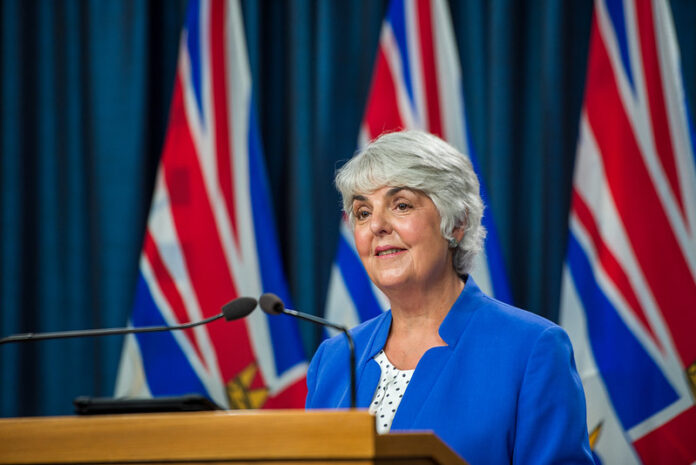“B.C. continues to show positive signs, including improving employment numbers, robust capital spending and the best debt affordability in Canada”
DESPITE strong fiscal results in the first three quarters of 2019-20, unforeseen changes in the fourth quarter due to COVID-19, including declines in tax revenues, ICBC losses and early measures to tackle the pandemic, affected the Province’s 2019-20 financial results.
“While the first three quarters of 2019-20 reflected a modest surplus and steady economic growth, COVID-19 led to lower tax revenues and losses at ICBC in the fourth quarter,” said Carole James, Minister of Finance. “Despite the impacts of COVID-19, I am encouraged that B.C. continues to show positive signs, including improving employment numbers, robust capital spending and the best debt affordability in Canada.”
The fiscal year ended with a deficit of $321 million, which is $595 million lower than the surplus projected in Budget 2019, mainly due to:
* costs related to B.C.’s initial COVID-19 response, such as public health measures;
* lower taxation revenue due to COVID-19; and
* a $298-million ICBC investment loss due to market conditions from COVID-19.
“The final quarter of the fiscal year brought many challenges,” James said. “B.C. isn’t alone in facing these challenges, but we are in a strong position to weather them. The investments we made in 2019-20, such as eliminating MSP premiums and investing in child care and housing, will make life more affordable and support people through COVID-19 as the Province develops a strong economic recovery plan.”
Public Accounts 2019-20 confirm the Province’s commitment to put people first through $3.4 billion in increased investments in health, community supports, education and social services, and a historic $4.8 billion in capital spending for hospitals, schools and highways.
Public Accounts 2019-20 show B.C. is in good financial standing with affordable debt levels at the end of the fiscal year and continues to lead the country as the only “AAA” accredited province. Provincial gross domestic product (GDP) for 2019 grew by 2.8%, above the national average of 1.7%.
Public Accounts 2019-20 highlights
More investments in capital infrastructure, like schools and hospitals, continue to build a strong economy with opportunities for British Columbians and will support a strong economic recovery through COVID-19.
Economic highlights:
* Provincial GDP for 2019 grew by 2.8%, the third-highest in Canada and higher than the Canadian average of 1.7%.
* Taxpayer-supported debt to GDP is 15.1%, the second-lowest in the country and only 0.1% higher than forecast in Budget 2019.
* B.C. continues to be the only province in Canada to hold a “AAA” credit rating.
* On an annual basis, B.C. had the lowest unemployment rate in Canada in 2019, with an average of 4.7%.
COVID-19 impacts:
* COVID-19 led to an estimated loss of $397 million in personal income tax revenue and $171 million in property tax revenue.
* Lower market investment values created an ICBC impairment loss of $298 million.
* $11 million in core government and $35 million in health authority costs are attributed to the final quarter of the fiscal year 2019-20.
* The Province received $68 million through the federal Canada Health Transfer before the fiscal year-end.
Operating results:
* The first three quarters of the 2019-20 fiscal year reflect a modest surplus and steady economic growth.
* The unanticipated impacts of COVID-19 resulted in a year-end deficit of $321 million, $595 million lower than the surplus forecast in Budget 2019.
* Revenue increased by $1.5 billion over the previous fiscal year and was $387 million lower than expected in Budget 2019.
* Expenses increased by $3.4 billion over the previous fiscal year for program investments and were higher than budgeted by $708 million.
Capital spending:
* Public Accounts 2019-20 include a total of $4.8 billion in taxpayer-supported capital spending on hospitals, schools, post-secondary institutions (such as student housing), transit and roads.
* Total capital spending was $1.5 billion below Budget 2019’s projection due to project-scheduling changes.
Debt levels:
* Governments, like the private sector, borrow to finance building long-lasting capital infrastructure, such as schools, hospitals and highways.
* Taxpayer-supported debt levels increased by $3.5 billion in 2019-20, mostly due to capital project spending, including schools and highways.
* Self-supported provincial debt increased by $2.7 million for investments in capital infrastructure power projects.
* The total debt for 2019-20 was $387 million lower than projected in Budget 2019.
* Despite the need for increased borrowing and higher debt levels, B.C. continues to have among the best debt metrics and credit ratings compared to other Canadian provinces and will benefit from low interest rates.
Fiscal challenges:
* Public Accounts 2019-20 show the changes government is making to reform ICBC are stabilizing the Province’s public auto insurer.
* The total net loss of ICBC in 2019-20 was $376 million, $777 million less than the previous year’s net loss of over $1.1 billion.
* Speculation and vacancy tax revenues were lower than anticipated in 2019-20, a sign that the tax is working to prevent much-needed rental units from sitting vacant, leading to a 19% increase in available long-term rental units.














